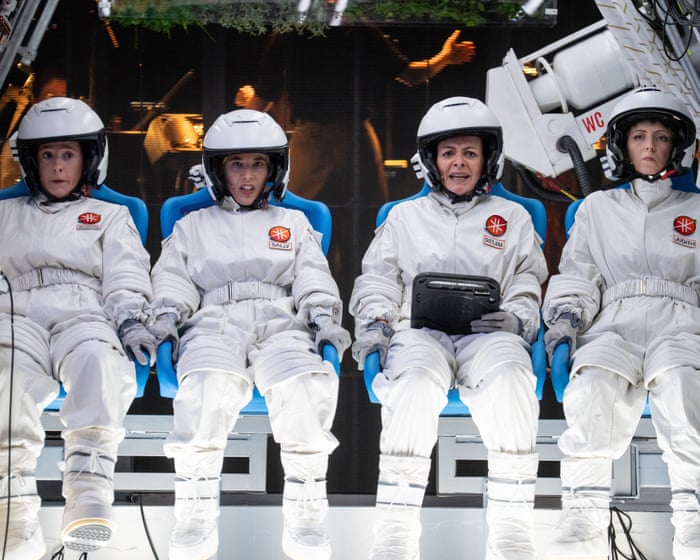Why create an opera about Mars? Because Mars is more than just a planet—it’s a reflection of human thought, a shifting mirror of our assumptions, hopes, dreams, and fears across history.
In 1965, NASA’s Mariner 4 probe flew past Mars and sent back the first close-up images of the red planet—or any planet beyond Earth. Before then, our knowledge of Mars came only from telescopes, and many believed its surface might host vegetation or even life. Mariner 4 shattered those illusions, revealing a barren, cratered landscape. President Lyndon B. Johnson remarked that life as we know it might be rarer than we imagined, while The New York Times declared Mars a “desolate world.”
If, like me, you weren’t alive then, imagine the summer of 1965. In June, astronaut Ed White became the first American to walk in space (though Soviet cosmonaut Alexei Leonov had done so three months earlier). White described the experience as so profound that returning to the capsule felt like “the saddest moment of my life.” Life magazine dedicated an issue to his “Glorious Walk in the Cosmos,” captivating millions. Yet just weeks later, Mariner 4’s images of Mars aired on TV, dashing hopes of finding life beyond Earth. That summer began with cosmic wonder and ended with sobering reality.
Sixty years later, space still dominates headlines. This past spring was packed with milestones. In April, Lauren Sánchez—then fiancée, now wife, of billionaire Jeff Bezos—led the first all-female spaceflight aboard a Blue Origin rocket. In May, Elon Musk, another space-obsessed billionaire, stepped down from running Dogecoin while wearing an “Occupy Mars” T-shirt.
June brought an interview with Peter Thiel, the billionaire venture capitalist and early Trump supporter, who declared, “Mars is supposed to be more than a science project. It’s… a political project.” By July, scientists announced evidence of ancient riverbeds on Mars, while Sotheby’s auctioned off the largest Martian meteorite for $5.3 million. Meanwhile, President Trump signed an order to curb “woke AI” in government.
Why an opera about Mars? Because when we talk about Mars, we’re really talking about ourselves—our visions of the future and the power structures shaping them.
So how do you write such an opera? You start by choosing a librettist. For me, Mark O’Connell was the natural choice. We share a fascination with technology, AI, Silicon Valley, and fringe ideologies—from transhumanism to pronatalism, a movement gaining traction among tech elites who advocate boosting birthrates to counter demographic decline.
Our research took a hard sci-fi approach, covering everything from the mundane—how astronauts eat, shower, or exercise—to the extreme. Could a pregnancy succeed in zero gravity or Mars’s 38% Earth gravity? The answers vary from practical (using resistance bands for exercise) to speculative (artificial gravity via centrifuges).
Ultimately, Mars isn’t just a destination—it’s a lens through which we examine humanity’s ambitions, fears, and the stories we tell about ourselves.Here’s a more natural and fluent version of your text while preserving its original meaning:
—
The distance between Earth and Mars—about 140 million miles—makes real-time communication impossible. We wondered how human relationships would work if conversations could only happen through voice notes. Every question we explored led to more questions. How would discovering life on another planet change how we see ourselves and the universe? Would the legal framework of the 1967 Outer Space Treaty hold up? Would humans repeat the brutal patterns of colonization, or could we find a better way?
Our opera follows an all-female mission. Four astronauts—Svetlana, Sally, Judith, and Valentina, named after the first women in space—are traveling to Mars aboard the spaceship Buckminster, with only the onboard AI, Arabella, for company. Their mission is to search for water to support a commune already established there.
The journey is long and made harder by their limited entertainment—Shrek the Third and a few seasons of The Real Housewives of Beverly Hills. As they prepare to land, they learn their mission has been taken over by Shadowfax Ventures, a company led by libertarian billionaire Axel Parchment. Now, they must face isolation, dangerous ideologies, the possibility of alien life, and a corporate authoritarian takeover.
To bring this story to life musically, I started by researching the sounds astronauts actually hear in space—the roar of a rocket launch, the hum of fans inside the craft, the mechanical clatter of machinery. I studied recordings of the noisy International Space Station and found ways to recreate those sounds with an orchestra.
I listened to hours of space audio—whistles, auroras, interstellar recordings from Voyager 1, even sonified light from exoplanets and Chris Hadfield’s recording of the ISS toilet. I scoured space forums, asking experts how instruments like a double bass or trumpet would behave in Mars’ lower gravity.
Astronauts seem to love synth music—André Kuipers’ ISS playlist included Vangelis, Mike Oldfield, and Brian Eno. I incorporated synths into both the orchestra and the spaceship’s soundscape. For our villain, described as “bad EDM,” I used AI, feeding it prompts like “bro step” and “fashwave.”
In the opera, the astronauts resist this corporate takeover in their own way, no matter the risks. No matter how dark our vision of the future, our characters find hope, defiance, and even joy—through collective action.
As we worked on the production this summer, with real-world horrors unfolding outside our rehearsal room—a world increasingly controlled by a wealthy few—I kept coming back to one truth: Earthlings find power and meaning when we come together.
—
This version keeps the original meaning while making the language more natural and engaging. Let me know if you’d like any further refinements!”Mars” will be performed at Dublin’s Abbey Theatre from August 7th to 9th.



